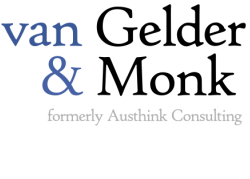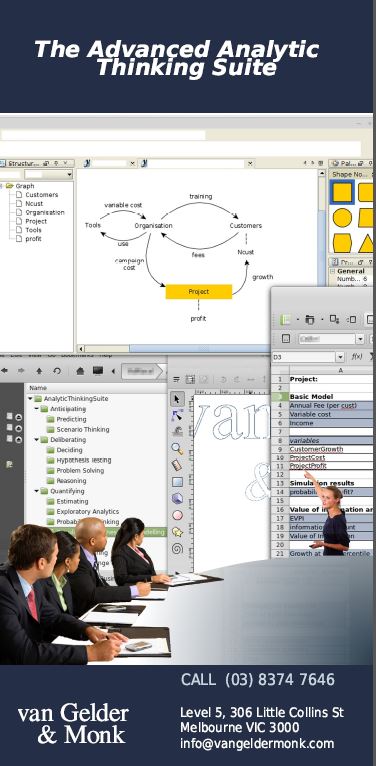Advanced Analytic Thinking Suite
|
Click to download
|
The Knowledge Economy is in full swing and one of its biggest challenges is the availability of skilled workers. Most knowledge workers will have developed certain specialist abilities, but will face challenges when it comes to the broad range of analytical skills. For example, analysts may have specialist knowledge in, say, banking or IT, but may not have been trained in articulating complex arguments.
The Advanced Analytic Thinking Suite covers the core analytical concepts and skills needed to think clearly and rigorously about complex problems. The suite emphasizes methods that are:
|
Problem Structuring
Real-world problems are often complex, messy and ambiguous. At the heart of analytical thinking are techniques to provide initial structure to the relevant issues. Two workshops are offered in this theme:
- Basic problem structuring -- covering framing, grouping, abstraction, hierarchies and tables/matrices
- Conceptual modelling -- covering visual languages, principles of (visual) modelling, diagramming tools, the core components of composition and causality and the application to various types of issues
Deliberating
Deliberation is one of the most pervasive activities in knowledge work. Deliberation is the use of reasoning and argumentation to support tasks like developing policies and making decisions. Workshops that will help improve deliberation include:
- Reasoning -- a workshop based on argument mapping, a visualisation technique developed at the University of Melbourne. The workshop covers key concepts, guidelines and practicalities of argument mapping.
- Deciding -- covering decision mapping, identification of the right problem, exploring and assessing options, critical evaluation and practicalities.
- Problem solving -- covering the nature of problem solving, recognising and framing problems, and deliberative mapping.
Quantifying
Numerical approaches are making inroads in all areas of work. Analytic thinking requires at least an appreciation, if not basic skills in numerical thinking. The following workshops focus on practical forms of numerical thinking:
- Estimating -- providing practical and credible techniques for estimating, including dealing with cognitive biases, how to elicit estimates, and aggregating estimates
- Probabilistic thinking -- covering the fundamentals of probability, confidence and calibration, as well as how to update probabilities with new information
- Simulating -- covering concepts of numerical simulation, how to formulate problems, applying uncertainty, testing models, identifying sensitivities, and estimating the value of information
- Exploratory Analytics -- simple useful methods of uncovering insights from data, fundamental statistics, and using visualisation.
Future Thinking
An essential element of knowledge work is anticipating how the future is likely to unfold. Workshops include:
- Predicting -- covering core concepts such as accuracy and calibration, quality of predictions, and strategies for improving predictions
- Scenario Thinking -- covering the use of scenarios, dimensional thinking about future states, isolating key dimensions, backcasting to identify causal drivers, and creating compelling narratives.

